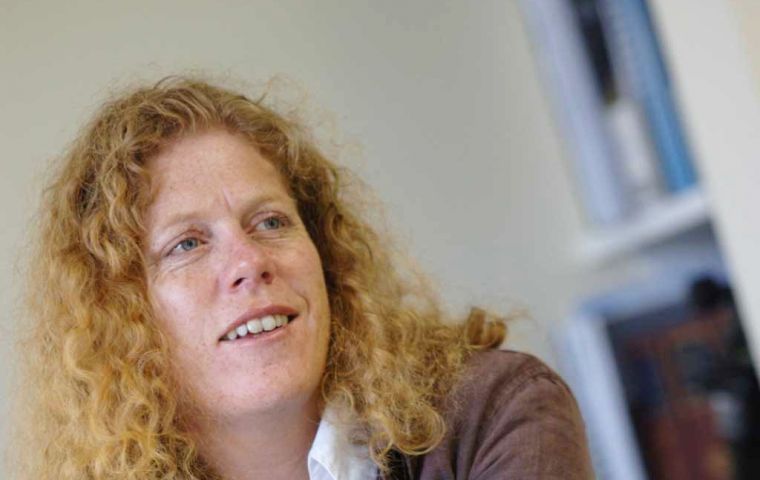MercoPress. South Atlantic News Agency
Falklands’ fishing company seeking good management label from MSC
 CFL Marketing Manager Janet Robertson
CFL Marketing Manager Janet Robertson For the first time a Falkland Islands fishing company is seeking to have its good management certificated by the internationally recognised Marine Stewardship Council (MSC).
Consolidated Fisheries (CFL) Marketing Manager Janet Robertson told Penguin News.
CFL entered into assessment in August this year. She believes that for the Falklands as well as CFL it will be advantageous to have an MSC certified fishery.
In Stanley this week to assess the company for certification have been Stephanie Good, Fishery Assessment Manager from the MSC and Jim Andrews of Interset Moody Marine, which is the certification body assessing the situation.
Mr Andrews told Penguin News this week that the way the MSC standard works is that any fishery globally is assessed against three principles: whether the fish stock is in good condition, impact of the fishery on the marine environment and how well the fishery is managed.
Mr Andrews is here to gather information, interview people and find out about all three areas of the fishery. He said ultimately, if the fishery is certified, the packaging material of the Consolidated Fisheries product will bear an eco-label. The idea is that the consumer sees the label and favours an MSC certified product.
For the fishing company, in terms of processes and retailers in many markets being certified by the MSC can be the difference between having access to the market and not, pointed out Mr. Andrews.
This is not the case currently with the Toothfish fishery, but for other fisheries, he said, if you are not MSC certified your range of buyers is very much reduced. Also there can be an effect on the price you get per kilo.
The assessment process looks at the measures that are in place to prevent illegal and unlicensed fishing.
Mr Andrews said that MSC is also very keen to ensure traceability through the whole supply chain, so when they certify a fishery, they certify what happens at sea up to the quay side and then they look at everything beyond that as well.
Asked what it was she was specifically observing in the Falklands, Stephanie Good said that part of her job was to look at the whole MSC fishery standard and review it in terms of how easy it was to interpret in practice.
She said, “I’m here to see in a practical setting how the standard is interpreted and what happens in the assessment process. “Hopefully I can learn things that I can bring back and feed into a review of standards which is planned for next year.”
Asked what changes, if any, had resulted in CFL operating procedure as a result of their bid for MSC certification, Janet Robertson said, “much of what was needed to be done was actually work that is done by the Falkland Islands Government Fisheries Department, because it is the management of the fishery which is critical: the science, the knowledge about the species and the impact on the environment.
“In that respect our application was heavily reliant on the Fisheries Department which already has a reputation for good, solid management.”
From the company’s side, Janet Robertson said that compliance with the MSC standard was more about making certain things more explicit and having clearer protocols in place, especially with regard to stock assessment principles.
They also had to look at their routine operating practices and protocols on board the vessel and make sure that they were up to the required standard, and that there were clear practices for the crew to follow which would minimise the impact of fishing activities as much as possible.
She said that everything the company had to do in this regard was already being done; it was just a case of making sure that standards were maintained and any malpractice was avoided.
Asked what she thought the company would get out of MSC certification, Ms Robertson said that the answer now was probably slightly different from what it would have been two or three years ago.
For many years the South Georgia Fishery was the only MSC certified toothfish fishery, and as a result of that, although the demand for certified toothfish was not great, it did mean that because there was a relatively small fishery providing it, there was a premium paid if you were selling an MSC certified fish.
Since then with the certification of a number of other toothfish fisheries around the world, and probably with supply exceeding demand, there was less likely to be much of a premium paid.
Although Consolidated Fisheries do not sell into Europe as a matter of course at present, if they wanted to they would be severely limited as to where they could sell it, if they were not MSC certified. (Penguin News)




Top Comments
Disclaimer & comment rules-

-

-

Read all commentsWell, as the Argentine government can't manage to piss in a pot they have no chance to achieve independent certification for their fisheries.
Nov 30th, 2012 - 11:00 am 0But heh, why bother with assessment? Jut put the logo on the packaging anyway and ignore another International Trade complaint went it comes in, it’s the Argentine way after all.
The Article says it's the Falklands asking for it Chris...
Nov 30th, 2012 - 12:04 pm 0Will Argentina send a flotiila of fishermen on a poaching mission to ensure the Falklands waters can't be deemed a sustainable stock?
Nov 30th, 2012 - 12:41 pm 0They've been threatening to overfish for a long time.
Commenting for this story is now closed.
If you have a Facebook account, become a fan and comment on our Facebook Page!